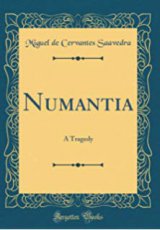The Siege of Numantia Page #17
The Siege of Numantia is a tragedy by Miguel de Cervantes set at the siege of Numantia. The play is divided into four acts. The dialogue is sometimes in tercets and sometimes in redondillas, but for the most part in octaves.
With such rigour, though the bread Were as water pure instead, Not one droplet could I drink! Take it to thee, sister dear, For, my senses to confound, Now I see the bread abound, Whilst my life is ebbing here! [He falls down dead. LYRA. Brother dear, and art thou gone? Neither breath nor life hath he; Ill is good in some degree When it cometh all alone. Fortune, wherefore dost thou grieve me, With one loss and then another? Wherefore at one time together Orphan, widow, dost thou leave me? O thou cruel Roman host! How thy sword doth gird me round With two corpses on the ground, Spouse and brother, both are lost! Sweetest husband, tender brother, You I'll match in loving well, For in heaven or in hell Soon I'll see the one and other! In the manner of my death I to part from you am loath; For the sword and hunger both Have to take my latest breath. Rather will I give my breast Point of dagger, than this bread; For to one who lives in dread Death is gain and sweetest rest. Am I coward, can it be? Arm of mine, what dost thou fear? Sweetest husband, brother dear, I am coming, wait for me! [At this point there enters a woman flying, and behind her a Numantian soldier with a short sword in his hand to kill her. Woman. Eternal Sire! O Jove compassionate! Protect me in this dire extremity! Soldier. Although thou hurry with a speed more great, Beneath my ruthless hand thou hast to die! [Exit the woman, and LYRA says: LYRA. Thy cutting sword, thy warlike arm of weight, On me their fatal power, good soldier, try; Let her who prizes life with life remain, And take mine own, for it is full of pain! Soldier. Although it is the Senate's stern command, That not one woman shall in life abide, Where shall we find the bold audacious hand Who would not from thy beauty turn aside? I, lady, am not one of such a band, Nor do I wish to be thy homicide; Some other hand and sword must strike for me, For I was born alone to worship thee. LYRA. This mercy which to me thou dost extend, O valiant soldier, I do swear to thee, And Heaven above its seal to this will lend, That I esteem it harshest cruelty! I would have held thee as a very friend, If with a steady hand and courage free Thou hadst transpierced my heart, so full of woes, And brought my wretched being to a close. But since thou wilt thy pity now bestow, Against my wish, and to increase my gloom, Then to my wretched spouse like pity show, And help me now to bear him to his tomb: Take thou my brother too, who lieth low Upon the ground, cut off with life in bloom; My husband went to death to save my life, While hunger bore my brother from the strife. Soldier. To all that thou requirest I adhere, Provided on the way thou wilt relate What brought thy loving spouse, and brother dear, To this the last extremity of fate. LYRA. My friend, I have no strength to speak, I fear. Soldier. Art thou exhausted? Is thy pain so great? Bear thou thy brother, for the load is less; And I thy spouse; it giveth more distress. [Exeunt, bearing the two bodies. SCENE II. Here enters a woman armed with a shield on the left arm, and a short lance in her hand, who represents WAR; along with her comes SICKNESS, leaning on a crutch, her head swathed with bandages, wearing a yellow mask; and HUNGER follows, clad in a robe of yellow buckram, wearing a yellow or discoloured mask; these figures may be represented by men, as they wear masks. WAR. Hunger and Sickness, ministers most dire Of my commands, which make the world to quail! Of life and health devourers in your ire, With whom nor cries, nor threats, nor rights avail! Since ye are cognisant of my desire, It needs not that again I tell the tale, How pleasure and content will fill my breast, If quickly ye fulfil my stern behest. The Fates, with that inexorable might, Whose energy none living can impair, Constrain me now my forces to unite With these sagacious Roman soldiers there, Who for a time will rise to glory's height, While those poor Spaniards perish in despair; But time will come when I shall change it all, Will smite the mighty, and assist the small. For I, who am the great and powerful War, (By countless mothers all in vain abhorred, Though he who curses me at times errs far, Unconscious of the worth that owns me lord) Do know right well that through all lands that are Shall flash the valour of the Spanish sword, At that sweet season when shall rule the land A Charles, a Philip, and a Ferdinand. SICKNESS. If Hunger now, our true and trusty friend, Had not so swiftly done her work and well, And made her homicidal power extend O'er all the folk that in Numantia dwell, Thy will through me would have secured its end, In such an easy manner as to swell The rich reward the Roman will obtain, Much better far than what he hopes to gain. Though Hunger, in so far as she hath sway, Now holds the Numantines in such a strait, That shut and barred is every open way Of happy exit from their adverse fate, Yet Fury's falchion, with its fearful play, The adverse sign with its tremendous weight, Within their midst with such a rigour reign, There is no need of hunger or of pain. Fierce rage and madness, thy attendant brood, Have taken foul possession of each breast, And thirst with equal relish for their blood, As if they did the Roman's grim behest. Fire, fury, slaughter are their chiefest good, To die--they reckon of all fates the best; To snatch the triumph from the Roman bands, Themselves will perish by their very hands. HUNGER. Now turn your eyes, and see the flaming fire, That blazes from the tall roofs of the town! List to the fearful sighings that expire From thousand breasts, while they their terror drown! Hark to the wailings terrible and dire Of beauteous women, who to death go down; Their tender limbs in flame and ashes lie, No father, friend, or love to heed their cry! As timid sheep, upon their careless way, Whom some ferocious wolf attacks and drives, Go hurrying hither, thither, all astray, With panting dread to lose their simple lives;
Translation
Translate and read this book in other languages:
Select another language:
- - Select -
- 简体中文 (Chinese - Simplified)
- 繁體中文 (Chinese - Traditional)
- Español (Spanish)
- Esperanto (Esperanto)
- 日本語 (Japanese)
- Português (Portuguese)
- Deutsch (German)
- العربية (Arabic)
- Français (French)
- Русский (Russian)
- ಕನ್ನಡ (Kannada)
- 한국어 (Korean)
- עברית (Hebrew)
- Gaeilge (Irish)
- Українська (Ukrainian)
- اردو (Urdu)
- Magyar (Hungarian)
- मानक हिन्दी (Hindi)
- Indonesia (Indonesian)
- Italiano (Italian)
- தமிழ் (Tamil)
- Türkçe (Turkish)
- తెలుగు (Telugu)
- ภาษาไทย (Thai)
- Tiếng Việt (Vietnamese)
- Čeština (Czech)
- Polski (Polish)
- Bahasa Indonesia (Indonesian)
- Românește (Romanian)
- Nederlands (Dutch)
- Ελληνικά (Greek)
- Latinum (Latin)
- Svenska (Swedish)
- Dansk (Danish)
- Suomi (Finnish)
- فارسی (Persian)
- ייִדיש (Yiddish)
- հայերեն (Armenian)
- Norsk (Norwegian)
- English (English)
Citation
Use the citation below to add this book to your bibliography:
Style:MLAChicagoAPA
"The Siege of Numantia Books." Literature.com. STANDS4 LLC, 2024. Web. 25 Nov. 2024. <https://www.literature.com/book/the_siege_of_numantia_60>.




Discuss this The Siege of Numantia book with the community:
Report Comment
We're doing our best to make sure our content is useful, accurate and safe.
If by any chance you spot an inappropriate comment while navigating through our website please use this form to let us know, and we'll take care of it shortly.
Attachment
You need to be logged in to favorite.
Log In